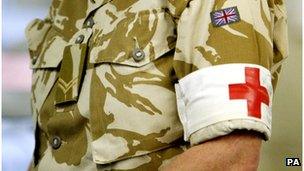Baby birth shock for soldier on Afghanistan deployment
- Published

A team of doctors has flown to Afghanistan after a British servicewoman gave birth to a boy having not realised she was pregnant.
Originally from Fiji, the unnamed Royal Artillery gunner is said to have only learned she was about to give birth on Tuesday after having stomach pains.
Mother and baby are "stable" in Camp Bastion, Helmand province, said the Ministry of Defence.
The woman went to Afghanistan in March and her baby was five weeks premature.
A specialist paediatric team from Oxford's John Radcliffe Hospital has left for Afghanistan, RAF Brize Norton has confirmed.
The MoD said the team would provide "care for mother and baby on the flight home".
It said: "It is not military policy to allow servicewomen to deploy on operations if they are pregnant. In this instance the MoD was unaware of her pregnancy."
BBC defence correspondent Caroline Wyatt said it was the first time a British soldier had given birth on the front line although up to 200 servicewomen had been sent home since 2003 from Iraq and Afghanistan when it was discovered they were pregnant.
"Military rules ban pregnant servicewomen from front-line duties, though last year another female British soldier gave birth two weeks after returning from her six-month deployment to Afghanistan," she said.
One woman went through a six-month tour without realising she had been pregnant.
Servicemen and women have pre-deployment medical checks depending on their roles, for example hearing tests, and complete physical fitness tests, such as a five-mile run.
But women are not routinely given pregnancy tests.
Charles Heyman, editor of Armed Forces of the United Kingdom, told the BBC this was a "loophole" in training and medical inspections and all that was needed was a simple pregnancy test to be carried out before deployment.
He said: "I'm certain nobody expected that a woman who was earmarked for operations in Afghanistan would be pregnant."
The birth took place four days after the camp was attacked by the Taliban who destroyed six aircraft and killed two US Marines.
Of Camp Bastion's medical facilities, Mr Heyman said: "It's a very good place to go if you have been shot but as a maternity ward very limited."
Fewer than 1% of British servicewomen ever deployed on operations have had to return home because they were pregnant, according to the MoD.
No women are deployed in the infantry where the primary role is to "close with and kill" the enemy - to engage in hand-to-hand combat.
But they do perform support roles such as medical duties and at any one time about 500 to 600 women are in theatre.
After a pregnancy servicewomen are not returned to the front line for at least six months.
'Negative reaction'
So-called denied, or undetected, pregnancies are thought to be rare.
Dr Anna David: Concealed pregnancies "may not be as uncommon as we think"
But Dr Anna David, a consultant in obstetrics at University College London, told the BBC: "It may be that this is not as uncommon as we think."
She said one study in Wales over an 11-year period had found one in 2,500 pregnancies was concealed.
"It is more common in younger women. There might be all sorts of reasons why one might actually not notice one is pregnant or not want to disclose it. One might be worried about a negative reaction from one's family and either not realise one is pregnant or not notice the symptoms that one might have," she said.
Patrick O'Brien, a consultant obstetrician at University College London Hospitals, said such a case would be seen about "once a year" - but there there were no accurate figures.
For Belinda Phipps, chief executive of the National Childbirth Trust, said: "Most of us put on two or three stone (28-42lbs) while we are pregnant and by the end of pregnancy feel very much as though it is dominating our entire being, so it would be hard to get to the later stages of pregnancy and not realise it.
"Also if you don't expect to be pregnant, are busy and stressful or in a life or death situation, you may be so focused on what is happening in your life that you don't spot or put to the back of your mind the signs of pregnancy you may be experiencing."
- Published20 September 2012
- Published20 September 2012